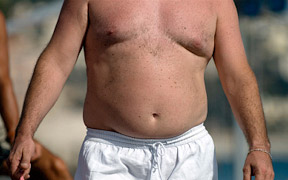DOES WHEY PROTEIN MAKE YOU FAT?

When it comes to high quality protein sources for your muscle building and fat burning program, whey protein really can’t be beaten.
It’s packed with high amounts of branched-chain amino acids (these are the primary triggers for muscle protein synthesis) and has the highest bio-availability of any protein source out there (meaning your body will absorb the greatest amount of the total protein content).
On top this, it is extremely convenient and its powdered form allows you to mix up and consume a quick and easy shake in just a matter of minutes.
But like most popular fitness supplements, whey protein is also surrounded by a ton of misguided myths and false information.
If you’re asking “does whey protein make you fat”, then you’ve probably already been exposed to some of these myths one way or another…
Does Whey Protein Make You Fat? – A Misguided Myth

First off, it should be noted that any macronutrient consumed in excess, whether it be protein, carbohydrates or fats, will lead to excess fat gain.
Every day your body expends a certain number of calories (through a combination of natural bodily processes and additional activity), and if your caloric intake consistently exceeds your caloric expenditure, some excess fat gain is inevitable.
However, there is absolutely nothing in whey protein that causes a greater increase in fat storage in comparison to any other food.
Whey protein is simply a natural dairy derivative that is extracted during the conversion of milk into cheese, and it is a “food” in the same way that steak, chicken or fish is food.
Asking “does whey protein make you fat” is really the same thing as asking “does chicken make you fat” or “does fish make you fat”.
Some people will claim that whey encourages fat storage because it is a fairly insulinogenic protein source, meaning that it causes a larger rise in insulin levels relative to other protein-rich foods.
However, within the context of a complete balanced diet, there is really no need to worry about insulin levels as fat storage is ultimately dictated by overall energy consumption versus overall energy expenditure.
Temporary rises and falls in insulin are irrelevant in the big picture, and besides, many of the staple carbohydrate sources that you consume will be more insulinogenic than whey protein anyway.
In fact, the complete opposite of this myth is true, as research has shown that whey protein actually has direct positive effects on fat loss in a variety of ways…
1) Whey protein increases thermogenesis, which is the number of calories that your body burns as heat energy each day.
2) Whey protein increases beta oxidation (fat burning) when used as a pre-workout protein source.
3) Whey protein helps to regulate cravings by increasing CCK secretion, which is a key hormone involved in regulating hunger. It also suppresses grehlin production, which is a hormone that stimulates appetite.
4) Whey protein helps to regulate your mood and energy levels during periods of calorie restriction by increasing serotonin production.
So, Does Whey Protein Make You Fat?

As long as it fits into your overall daily protein intake, whey protein will absolutely not make you fat.
In fact, whey protein will actually help you burn fat at a faster rate when consumed on a regular basis.
If you’re consuming a high calorie mass gainer that uses whey as a protein source, then you can certainly run into some issues if you aren’t careful. However, this is due to the overall calorie content of the shakes (due to the high carbohydrate content) and not the whey protein itself.
If you found this article helpful, make sure to sign up for your FREE custom fitness plan below...




